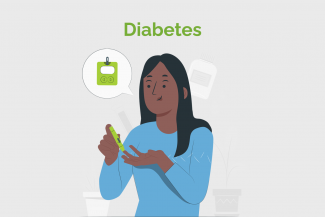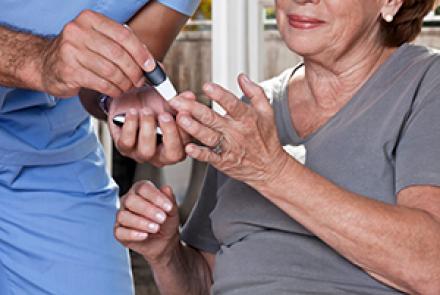
Managing blood sugars effectively is really important in reducing your risk of future diabetes complications. Untreated diabetes can lead to many serious complications.
Complications of diabetes:
Acute complications require immediate medical attention.
- Hypoglycemia: Occurs when blood sugar levels drop to dangerously low levels, resulting in symptoms such as weakness, dizziness, confusion, and in severe cases, seizures or loss of consciousness.
- Hyperglycemia: Prolonged high blood sugar levels can lead to various symptoms such as frequent urination, increased thirst, blurred vision, fatigue, and slow healing of wounds.
- Ketoacidosis - When the body lacks insulin to use glucose for energy, it begins to break down fats for fuel. This process produces ketones, which can build up in the blood and lead to ketoacidosis. It can lead to dehydration, electrolyte imbalances, and life-threatening complications.
Microvascular complications – Eyes, Nerves and kidneys are most commonly affected.
- Retinopathy, Glaucoma, Cataract and damage to eye vessels can lead to blindness if left undetected and untreated. Watch this video on how to prevent vision loss in diabetes:
https://www.patientsengage.com/news-and-views/diabetes-vision-loss-how-… - High blood pressure and blood glucose levels damages small blood vessels and excess load to kidney results in Nephropathy.
- Damage to nerves and reduced blood flow leads to vaginal dryness in women and erectile dysfunction in men. This can lead to impotency.
- High blood glucose damages peripheral nervous system leading to Diabetic Neuropathy. This can lead to numbness, tingling, loss of sensation and pain in the extremities, and affect the digestive and urinary system. Lack of sensation can lead to undetected hand and feet wounds which can become infectious or gangrenous.
Macro vascular complications – Brain, Heart and other extremities can be affected.
- Cardiomyopathy, Stroke, Rheumatoid Arthritis, Osteoporosis, Cognitive impairment or Myocardial infarction can happen due to large vessel damage.
- Narrowing of blood vessels can reduce the blood flow to feet. Feet wounds are likely to heal slowly leading to gangrene or other complications.
Gestational diabetes (diabetes during pregnancy) if not treated properly can lead to following complications in baby:
- Macrosomia – It is generally referred as large babies. When a pregnant woman has elevated blood sugar levels, the excess glucose can pass through the placenta to the baby and the baby's pancreas responds to the high glucose levels by producing more insulin, which can lead to excessive growth. These babies are larger than average at birth. i.e.,4kg,
- Neural tube defect - Abnormalities in the development of the nervous system in babies born to mothers with diabetes during pregnancy is considered as neural tube defect.
- Spina bifida is a condition where the baby's spine does not develop properly, resulting in a gap in the spine.
- Anencephaly is a severe neural birth defect in which a large portion of the brain and skull do not develop properly
- Hydrocephalus occurs when there is an abnormal accumulation of cerebrospinal fluid in the brain. This can lead to an enlarged head, developmental delays, and potential neurological issues.
- Cognitive impairments can lead to emotional, behavioral issues in babies, difficulties with learning, memory, attention, and executive functioning skills.
To know more about Gestational diabetes and its management:
https://www.patientsengage.com/conditions/diabetes-during-pregnancy-wha…
https://www.patientsengage.com/conditions/gestational-diabetes-post-del…
Lifestyle modifications:
Blood sugar monitoring
Regular monitoring of blood sugar levels is crucial in managing type 1 diabetes. This may involve using a blood glucose meter to check blood sugar levels multiple times a day or using a continuous glucose monitoring (CGM) system that provides real-time glucose readings.
Healthy eating plan
Making the right food choices is very important in managing diabetes. Following a well-balanced diet is essential for diabetes management. This includes consuming a variety of nutrient-dense foods, controlling portion sizes, and monitoring carbohydrate intake to ensure blood sugar levels remain stable. Emphasizing whole grains, lean proteins, fruits, vegetables, and limited consumption of processed foods, sugary drinks, and high-fat foods.
Physical Fitness
Exercise plays a key role in managing diabetes and helps to bring down your blood sugar level. Depending on your blood sugar level, plan a sustainable exercise regimen with the help of your doctor or fitness expert. Do be aware that exercise will have an impact on your blood sugar level, lowering it for hours after you exercise. Check your blood sugar before and after your exercise, so you know how your body is reacting to the activity. If necessary, have a snack before you start or after you finish to keep your blood sugar stable. Exercise has many other benefits, such as lowering cholesterol, better blood circulation, weight loss, stress relief etc.
Stress management
Chronic stress can contribute to elevated blood sugar levels. Adopting stress-management techniques such as meditation, deep breathing exercises, or engaging in hobbies can help individuals better cope with stress. Do what you love and reduce stress!
Take charge: Your action plan
- Lose 5 to 10 per cent of your body weight if you are overweight. For eg. if you weigh 70kg, that means a weight loss of 3.5 to 7kg
- Eat healthily (See our healthy meal plans and delicious recipes)
- Exercise for minimum of 30 minutes a day (See https://www.patientsengage.com/healthy-living/best-exercise-options-per… and https://www.patientsengage.com/healthy-living/best-exercises-diabetes-m…)
- Check your blood pressure. Aim for a maintaining a blood pressure of <130/80mmHg
- Check your cholesterol level regularly. Aim for: Triglycerides <150mg/dl. High density lipoprotein >=40mg/dl
- If you smoke, stop
- Self-monitor your blood glucose level with a home blood glucose meter. Aim for: Fasting blood glucose <100mg/dl, two-hour post meal BG <140mg/dl, HbA1c within normal range
- Consult your diabetologist or endocrinologist once every six months. An endocrinologist specializes in the study of glands and hormones while a diabetologist specializes in diabetes, which is an illness of the pancreas gland.
Know your support team: Who can help you stay healthy?
Diabetes is a complicated disease, and you may need more than your diabetologist or endocrinologist to manage it and stay healthy. Because diabetes can affect different parts of the body, you may also need an:
- Ophthalmologist (eye doctor)
- Heart specialist
- Foot doctor
- Diabetes nurse educator (he/she teaches patients how to self-monitor their diabetes, help in emergencies and also advise on doctors to consult to manage complications) who can advise on doctors to consult, and the nurse educator directs the people
- Dietitian
- Fitness professional
- Psychologist or other mental health professional
3 simple steps for diabetes management (E-book): https://www.patientsengage.com/resources/ebooks-list
Know diabetes related terms: https://www.patientsengage.com/conditions/diabetes-terms-explained
Read more about how people live happily with diabetes: https://www.patientsengage.com/personal-voices/diabetes
Updated February 2025

















